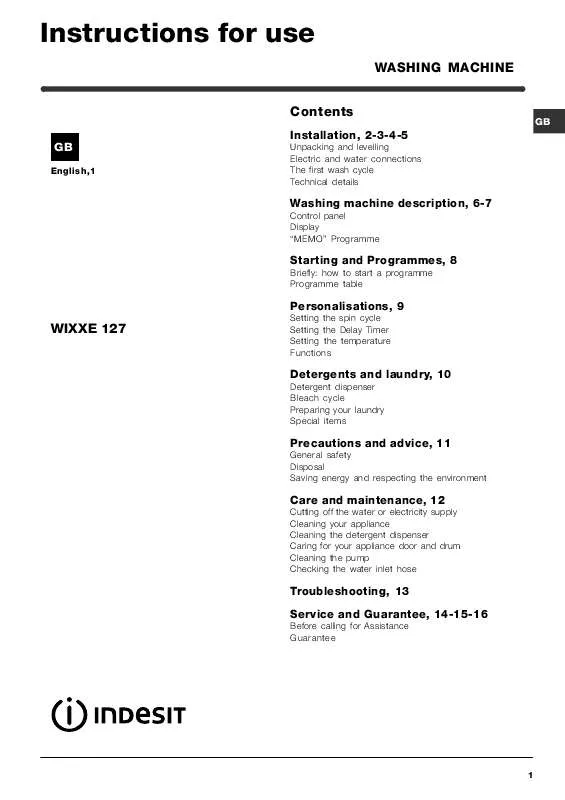Detailed instructions for use are in the User's Guide.
[. . . ] Instructions for use
WASHING MACHINE Contents
GB
English, 1
GB
Installation, 2-3-4-5
Unpacking and levelling Electric and water connections The first wash cycle Technical details
Washing machine description, 6-7
Control panel Display MEMO Programme
Starting and Programmes, 8
Briefly: how to start a programme Programme table
Personalisations, 9
WIXXE 127
Setting the spin cycle Setting the Delay Timer Setting the temperature Functions Detergent dispenser Bleach cycle Preparing your laundry Special items
Detergents and laundry, 10
Precautions and advice, 11
General safety Disposal Saving energy and respecting the environment
Care and maintenance, 12
Cutting off the water or electricity supply Cleaning your appliance Cleaning the detergent dispenser Caring for your appliance door and drum Cleaning the pump Checking the water inlet hose
Troubleshooting, 13 Service and Guarantee, 14-15-16
Before calling for Assistance Guarantee
1
Installation
GB
Keep this instruction manual in a safe place for future reference. Should the appliance be sold, transferred or moved, make sure the instruction manual accompanies the washing machine to inform the new owner as to its operation and features. Read these instructions carefully: they contain vital information on installation, use and safety.
Levelling your appliance correctly will provide it with stability and avoid any vibrations, noise and shifting during operation. If it is placed on a fitted or loose carpet, adjust the feet in such a way as to allow enough room for ventilation beneath the washing machine.
Unpacking and levelling
Unpacking
Electric and water connections
Connecting the water inlet hose
1. [. . . ] When this function is set, programmes 4 and 6 will end, with the laundry left to soak (Anti-crease), and the relative button flashes: - to conclude the cycle, press the START/RESET button or the EASY IRON button; - to run the draining cycle alone, set the knob to the relative symbol and press the START/RESET button. This function is incompatible with the STAIN REMOVAL function.
Extra Rinse
1, 2, 3, 4, 7, 8, 9, 11, 12, Rinse cycle.
Easy iron
3, 4, 6, 7, 8, 9, Rinse cycle.
The machine has an intelligent built in check for out of balance loads. To let protect your machine it may reduce the
final spin speed if an unbalanced load is detected.
The balancing attempts may extend the total duration of the cycle, up to a maximum of 10 minutes. 9
Detergents and laundry
GB
Detergent dispenser
Good washing results also depend on the correct dose of detergent: adding too much detergent won't necessarily make for a more efficient wash, and may in fact cause build up on the interior of your appliance and even pollute the environment. Open up the detergent dispenser and pour in the detergent and fabric softener, as follows.
Preparing your laundry
Divide your laundry according to: - the type of fabric/the symbol on the label. - the colours: separate coloured garments from whites. Empty all pockets and check for loose buttons. Do not exceed the weight limits stated below, which refer to the weight when dry: Sturdy fabrics: max 7 kg Synthetic fabrics: max 3 kg Delicate fabrics: max 2 kg Wool: max 1, 5 kg
How much does your laundry weigh?
4 3
1
2
compartment 1: Detergent for pre-wash (powder) Before pouring in the detergent, make sure that extra compartment 4 has been removed. compartment 2: Detergent for the wash cycle (powder or liquid) Liquid detergent should only be poured in immediately prior to the wash cycle start. compartment 3: Additives (fabric softeners, etc. ) The fabric softener should not overflow from the grid. extra compartment 4: Bleach
1 1 1 1 1
sheet 400-500 g pillow case 150-200 g tablecloth 400-500 g bathrobe 900-1, 200 g towel 150-250 g
Special items
Curtains: fold curtains and place them in a pillow case or mesh bag. Wash them separately without exceeding half the appliance load. Use programme 6 which excludes the spin cycle automatically. Quilted coats and windbreakers: if they are padded with goose or duck down, they can be machine-washed. Turn the garments inside out and load a maximum of 2-3 kg, repeating the rinse cycle once or twice and using the delicate spin cycle. Wool: for best results, use a specific detergent, taking care not to exceed a load of 1, 5 kg.
Do not use hand wash detergent because it may form too much foam.
Bleach cycle
Traditional bleach should be used on sturdy white fabrics, and delicate bleach for coloured fabrics, synthetics and for wool.
Place extra compartment 4, provided, into compartment 1. When pouring in the bleach, be careful not to exceed the "max" level indicated on the central pivot (see figure). To run the bleach cycle alone, pour the bleach into extra and compartment 4, set the Rinse programme enable the Stain removal function (see page 9). To bleach during a wash cycle, pour in the detergent and fabric softener, set the desired programme and enable the Stain removal function (see page 9). The use of extra compartment 4 excludes the possibility of using the pre-wash cycle.
10
Precautions and advice
The washing machine was designed and built in compliance with the applicable international safety regulations. The following information is provided for your safety and should consequently be read carefully.
disposed of in the normal unsorted municipal waste stream. Old appliances must be collected separately in order to optimise the recovery and recycling of the materials they contain and reduce the impact on human health and the environment. [. . . ] The appliance has been used for normal domestic purposes only. The appliance has not been altered, serviced, maintained, dismantled, or otherwise interfered with by any person not authorised by us. Any repair work must be undertaken by us or our appointed agent. Any parts removed during repair work or any appliance that is replaced become our property. [. . . ]


